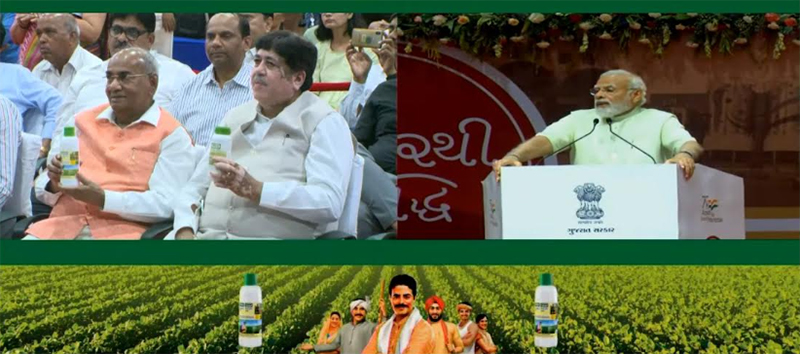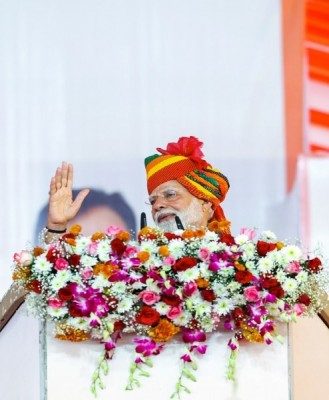 Nano Urea
Nano Urea
Gujarat: PM inaugurates Nano Urea plant
Gandhinagar: Prime Minister Narendra Modi on Saturday inaugurated the Nano Urea (Liquid) Plant constructed at IFFCO, Kalol at the 'Sahakar Se Samriddhi' programme in Gujarat's capital Gandhinagar.
The Prime Minister spoke about the revolutionary changes nano urea will bring for farmers in the coming times.
"Just imagine the strength of one sack of urea is compressed into one half litre bottle of nano urea. How much transportation cost will it reduce and benefit our farmers. This will be such a huge support for our small farmers," he said.
The ultramodern Nano Fertiliser Plant has been established for increasing crop yield through the use of Nano Urea.
The plant, built at a cost of around Rs 175 crore, will produce about 1.5 lakh bottles of 500 ml urea per day.
"The capacity of the plant at Kalol is to produce 1.5 lakh bottles. But in coming times, eight more such plants are going to be established in the country," added the Prime Minister.
He said the technology-driven nano-urea plants in the country will be able to reduce India's import dependence and help farmers by reducing logistics costs.
"We have also worked on re-starting composting plants across the country. The UP and Telangana plants are already operational. Soon, the country will achieve 'aatmanirbharta' in fertilisers," he said.
The Prime Minister said that India imports urea from foreign countries, in which a 50 kg bag of urea costs Rs 3,500, but the same urea bag is given to farmers for only Rs 300.
"The government bears a load of Rs 3,200 on each bag of urea. We have tried to face all the difficulties, but not let our farmers suffer," he added.
He said despite several challenges like the Covid-19 pandemic, the government ensured availability of fertilisers to the farmers.
"Despite the global increase in prices of phosphate-based fertilisers, we have tried to make sure that the increase in prices does not affect our farmers," he added.
"After forming our government in 2014, we did 100 percent neem coating of urea, which ensured that the farmers got adequate urea supply," he said.
India is the second biggest consumer and third-biggest producer of fertilisers.
"Seven-eight years ago, most of the urea could not reach our farms and was stolen by black marketeers. Urea factories closed down because of lack of new technologies...We started the work to restart five closed fertiliser factories in UP, Bihar, Jharkhand, Odisha and Telangana," he said.
Modi said the success of the cooperative model in the dairy sector is an example of how villages can turn prosperous using it.
"India is the world's largest producer of milk, in which Gujarat has a huge share. The dairy sector has been growing rapidly over the years and is also contributing more to the rural economy.
"This model has made India the largest dairy producer in the world, with production worth Rs 8 lakh crore," he said.
The dairy sector is majorly driven by women and small farmers with 70 lakh women of Gujarat as the biggest contributors.
"The strength of cooperatives, especially women working in them, can be seen through how Lijjat Papad and Amul have become globally renowned brands," the Prime Minister added.
More than 7,000 representatives from various cooperative institutions of the state participated in the seminar.
(With inputs from UNI)
Support Our Journalism
We cannot do without you.. your contribution supports unbiased journalism
IBNS is not driven by any ism- not wokeism, not racism, not skewed secularism, not hyper right-wing or left liberal ideals, nor by any hardline religious beliefs or hyper nationalism. We want to serve you good old objective news, as they are. We do not judge or preach. We let people decide for themselves. We only try to present factual and well-sourced news.







